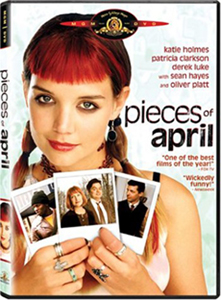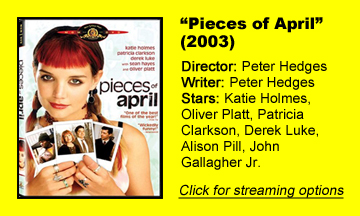A near-perfect movie about an imperfect family, “Pieces of April” (2003) could serve as a template for how to make a low-budget film. Writer-director Peter Hedges, who also penned 2002’s “About a Boy” but is too talented to have such a sparse resume, follows Thanksgiving-meal-cooking April (Katie Holmes), her boyfriend Bobby (Derek Luke), and April’s traveling family in a deceptively loose style, using a hand-held-camera.
Yet the screenplay is a masterpiece of economy — a series of small moments that provide big insights.
Dysfunctional love
The one thing I’ve wondered about on every viewing is: “Could a mother-daughter relationship possibly be this bad?” Broadly, “April” has the expected message of appreciating your loved ones while they are here – one of April’s neighbors, a crazy cat guy, even spells this theme out through dialog.
But the Joy-April relationship goes beyond the simple annoyances and disagreements within a family that loom especially large for teens. April is possibly in her 20s, but if so, she has an extended or delayed adolescence, like a Gilmore Girl (see the oven used for shoe storage) but with all the negative womanchild traits and none of the positive.
Joy (Patricia Clarkson, in a deservedly Oscar-nominated turn) can’t think of any happy memories with her firstborn daughter. This strikes me as unlikely for a white, middle-class, suburban family of five.
Joy admits to good relationships with Timmy (John Gallagher Jr.) and Beth (Alison Pill), and she’s happily married to Jim (Oliver Platt), so what is it about April?
However, this central oddity of the film is not a deal-breaker. In fact, the mystery makes “Pieces of April” richer on each viewing. Hedges provides hints. We might be catching Joy — who has had a mastectomy, is regularly nauseous and might be in the process of dying at age 42 — on a bad day.
A dysfunctional day
As she tries with frustration to find a neighbor who will let her use their oven, April is fearing the worst about the dinner and therefore emphasizes the worst parts of her relationship with her mom when Bobby inquires.
Softening the blow of this harsh core relationship, “Pieces of April” is often hilarious. For some reason – perhaps the naturalistic shooting and acting – it makes obvious gags fresh again, like when April stops and starts in an attempt to tell the Thanksgiving story to Chinese immigrants in her ratty New York apartment building.
Holmes, fresh off of her star-making role on “Dawson’s Creek,” is a little stiff in the more-improvised intimate scenes with Bobby and when playing the straightwoman to neighbor Wayne’s (Sean Hayes) bizarre antics. But in the Chinese apartment scene, her delivery is flawless as April realizes how bad (and accurate) she is making European settlers sound.
Another great gag comes when middle-aged black neighbor Evette (Lillias White) goes off on a sarcastic rant about poor white, young, privileged April’s “problems,” then we cut to Evette crying, April having outlined her mom’s cancer in the interim. It’s obvious, but funny.

“April” is about race, but never in blunt fashion; Jim and Joy don’t express racism toward Bobby, but the theme lurks below the surface.
April hasn’t told them Bobby is black, and they are scared when a bloodied Bobby runs up to their parked car in this grimy NYC neighborhood. Joy takes it as a personal attack that April has chosen to live in such a place – which April has likewise not described in detail prior to the visit.
Humanizing laughs
But every time “April” flirts with getting too serious, it allows us an excuse to laugh while humanizing everyone. The film is often shocking, funny and heartfelt in quick succession.
It’s not until the end that we’ve grown wise to Hedges’ tricks, but he has another up his sleeve: By chronicling the dinner with Timmy’s snapshots, it drives home the film’s emphasis on memories.
“Pieces of April” could’ve turned out merely bittersweet – one nice day to somewhat make up for two decades of a tragic mother-daughter rift – but I subscribe to a happier interpretation: The film got all of the bad memories out of the way first, and the family (and their new friends) will share happy memories after the credits, into the Thanksgiving night.


